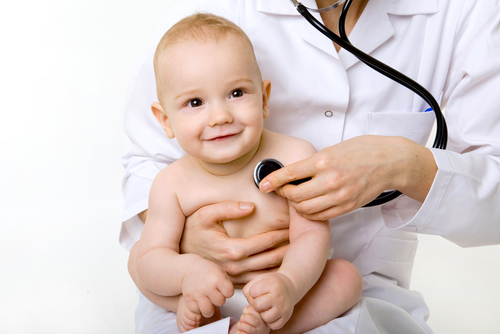Not long after your child’s arrival into the world, he’ll be going on his first appointment: a check-up with his pediatrician. Determining which doctor will best fit yours—and your child’s—needs is extremely important, considering he’ll be paying annual visits to this person for next eighteen years.
Before you go ahead and pick the first name under the “pediatrician” listing in the Yellow Pages, think about what you are looking for in a physician. Here’s how to go about selecting the right doctor for your child and what you can expect from office visits over the next year.
For Your Consideration
When it comes to choosing a doctor for your baby, comfort and convenience are equally important factors. “New parents need to feel comfortable with their pediatrician—someone they can ask questions and feel listened to,” says Dr. Margaret Riley, assistant professor of family medicine,
Because your pri
Other medical inquiries to make in advance are: which hospital(s) the pediatrician is affiliated with; whether the office has weekend and/or evening hours; and what type of support staff, such as nurses and nurse practitioners, are available.
First Things First
Once you’ve chosen a pediatrician, you can expect your child’s first office visit 1-3 days after discharge. Experts say plan on bringing your insurance card, medical records from the hospital (including any lab work) and your emergency contact info. “Parents should also be prepared to fill out forms granting other adults—grandparents, babysitters, etc.—permission to bring their baby to appointments if necessary,” says Riley. Don’t worry about your child’s baby certificate and Social Security card, which are typically not received until a few weeks after birth.
At each visit, your child will be thoroughly examined, measured and weighed. “Your doctor will ask questions about your baby’s feeding, urinating/bowel movements, sleep habits and any other concerns you may have,” says Cronan. And you may very well also be asked about your own health habits (whether or not either parent smokes) and if there are any medical problems that run in the family.
As your child matures, your doctor will inquire about developmental milestones and ask when or if he has started to roll over, sit up, crawl and walk. Appropriate safety precautions for your child’s age may also be discussed.“Parents should make a list of any specific questions they have about their infant, as it’s very easy to forget them when actually at the appointment,” advises Riley.
Visits and Vaccinations
Once your child has successfully completed his first check-up, you can expect to schedule routine wellness visits at two, four, six, nine and twelve months of age. At each visit, your baby will receive a head-to-toe exam, followed by age-appropriate shots (typically at two, four and six months). Beginning at six months, babies are able to receive a flu vaccination for the first time which, Cronan says, is strongly recommended every year.
Speaking of cold and flu season, taking special precautions with your newborn will keep her healthy in the months ahead. Doctors recommend frequent hand-washing for you and any caregivers (including grandparents, babysitters and childcare providers) who have close contact with your child. “People who have cold/flu-like symptoms should avoid infants, if possible—particularly newborns under six weeks as infections can be very serious in this age group,” cautions Riley.
_x000D_“Keep in mind that routine colds are difficult to prevent, and most infants get around six colds per year,” notes Cronan. Staying in touch with child care providers alerts you to any outbreaks that may compromise your baby’s health.




